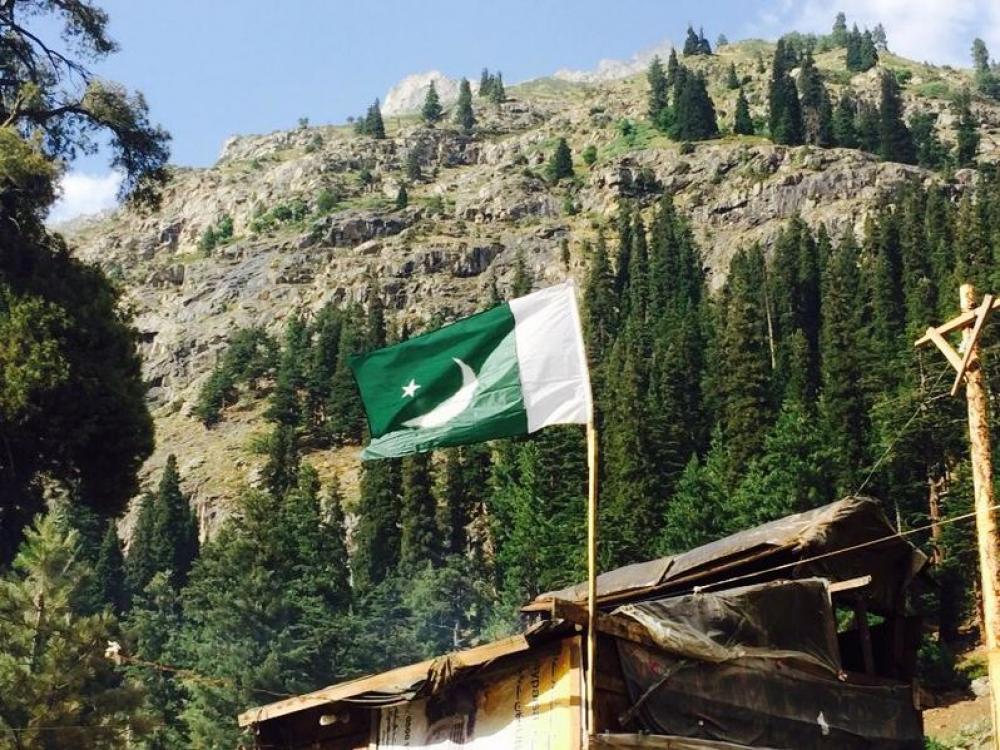Just Earth News | @justearthnews | 26 Apr 2023, 01:37 pm Print

Representational image by Mehak Wajid Ali via Wikimedia Commons
Islamabad: Militant Islamic groups like Tehreek-e-Labbaik Pakistan (TLP) have been let loose to attack and threaten the minority sect, Ahmadis, in Punjab and other provinces of Pakistan.
The TLP had been raising the banner of blasphemy and other religious extremist acts in connivance with the state, including the army.
In fact, senior Army officers were witnessed paying TLP members to call off their Islamabad blockade in October 2021 during the Imran Khan regime.
The group has been lying low for a year now with both its patrons, the army as well as Imran Khan pitted against each other.
Then, out of a sudden, over 100 members of the militant group, accompanied by seven policemen, vandalised and destroyed a 118-year old Ahmadi mosque in Sargodha, Punjab.
The arsonists demolished the old mosque’s minarets and domes.
Some of the attackers asked the Ahmadiyyas to leave Pakistan for good or face similar actions across Pakistan.
According to witnesses, the police remained mute spectators during the attack and did not respond to cries of help from the three elderly mosque residents, who somehow fled for their lives.
The Sargodha attack followed the February assault on an Ahmadi mosque in Karachi.
The attack was led by a TLP provincial assembly member of Sindh province, Mufti Qasim Fakhri, complaining that the use of minarets and domes by the community was illegal.
Journalist Naila Inayat who shared the video on Twitter said that the Pakistani constitution forbids Ahmadiyyas from using structures that ‘look like a mosque’.
The same month, in Gujrat, a 75-year-old Ahmadi doctor named Rasheed Ahmad was shot dead in Gotriala, district Gujrat. He was shot several times while he was examining patients at his clinic.
The mosque attack was the fifth Ahmadi mosque attack in the last 3 months, an indication of how the pro-Army militant Barelvi group had been tasked to target minorities like the Ahmadis.
The Human Rights Commission of Pakistan (HRCP) in a fact finding mission indicated an alarming rise in the persecution of members of the Ahmadia community in Gujranwala and surrounding areas—specifically, the desecration of their graves, the destruction of minarets at Ahmadi sites of worship and first information reports (FIRs) filed against community members for carrying out ritual animal sacrifice on Eid.
The report pointed out that the civil administration in Gujranwala and Wazirabad were directly involved in destroying the minarets on Ahmadi sites of worship in December 2022 and January 2023, following objections raised by TLP members.
Estimated to be four million in number, Ahmadis have been the target of various Sunni groups for decades now.
The state has been the group’s biggest enemy, making it illegal for Ahmadis to call themselves Muslims, practice faith and its traditions.
In 1974, Pakistan declared Ahmadis as ‘non-Muslims’ through a constitutional amendment.
Ahmadis have since been attacked, tortured and killed for practising Islamic rituals. Their religious places have been attacked openly and with impunity. Their burial grounds have been desecrated so often that such acts do not attract the media.
Two years ago, over 200 graves were damaged and gravestones demolished in Punjab alone. But there was no shock, no anger, no shame anywhere in Pakistan.
There was stunning silence when a TLP cleric called on his followers to attack Ahmadi pregnant women to "make sure that no new Ahmadis are born".
He said that "there is but one punishment for blasphemers, decapitation."
There is currently a smear campaign raging against the Ahmadis on whatsapp.
A viral video in circulation depicts Ahmadis as the worst of all forgers and counterfeiters. They are labelled “kāfir,” the Arabic word for “infidels” and “disbelievers,” and derided as “Qadianis”.
Nasim Malik, Secretary General of the London-based NGO, International Human Rights Committee (IHRC), said, “For Ahmadis, the cultural and political climate in Pakistan is quite hot. Ahmadis cannot count on any social media platform in the country to speak out their mind, clarify their position, and inform the public. They don’t have any. So, the power of their adversaries multiplies. As to traditional media, they don’t dare to touch the subject. They are afraid of speaking truthfully about Ahmadis. And politicians are intimidated too.”
The recent series of attacks on Ahmadi mosques and graves show the use of TLP to raise the pitch of the anti-Ahmadi campaign.
The TLP is one of the many instruments used by the state to sustain Sunni extremist supremacy in the society.
The Tehreek-e-Labbaik Pakistan (TLP) was founded by Khadim Hussain Rizvi in 2015, which coincided with the rise of Imran Khan and the hybrid regime propagated by the Pakistan Army.
The TLP was weaponised to support Imran Khan’s anti-blasphemy campaign, a clever way adopted by his patrons in Rawalpindi to give him a religious heft.
The first mobilisation of the militant group took place in 2017 as a ploy to oust Nawaz Sharif.
The militant group came out into the streets, caused widespread arson and violence, to stop the government from giving concessions to the Ahmadis in elections.
It is well known that the group was encouraged by the ISI to pave the way for Imran Khan’s electoral campaign.
The protesters were `managed` by the army’s top leadership, including Lt.General Faiz Hameed, the then Director General of ISI.
- Family alleges forcible disappearance of woman by Pakistani agencies
- Caught under wheels: Hindu man dies trying to stop fuel theft in Bangladesh
- Fire at Hindu teacher’s home rekindles concerns over minority attacks in Bangladesh
- UK MP Bob Blackman raises alarm over rising attacks on Hindus in Bangladesh
- Winter without gas: Hazara women stage sit-in outside SGC office in Pakistan





-1763561110.jpg)
